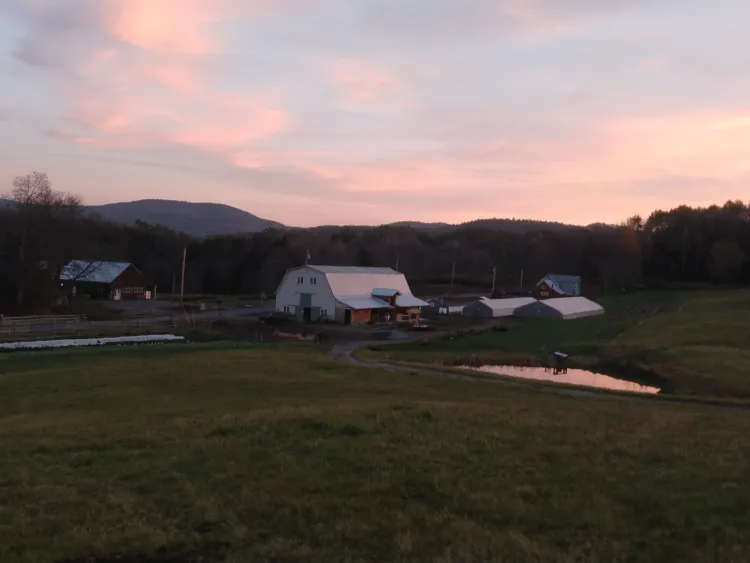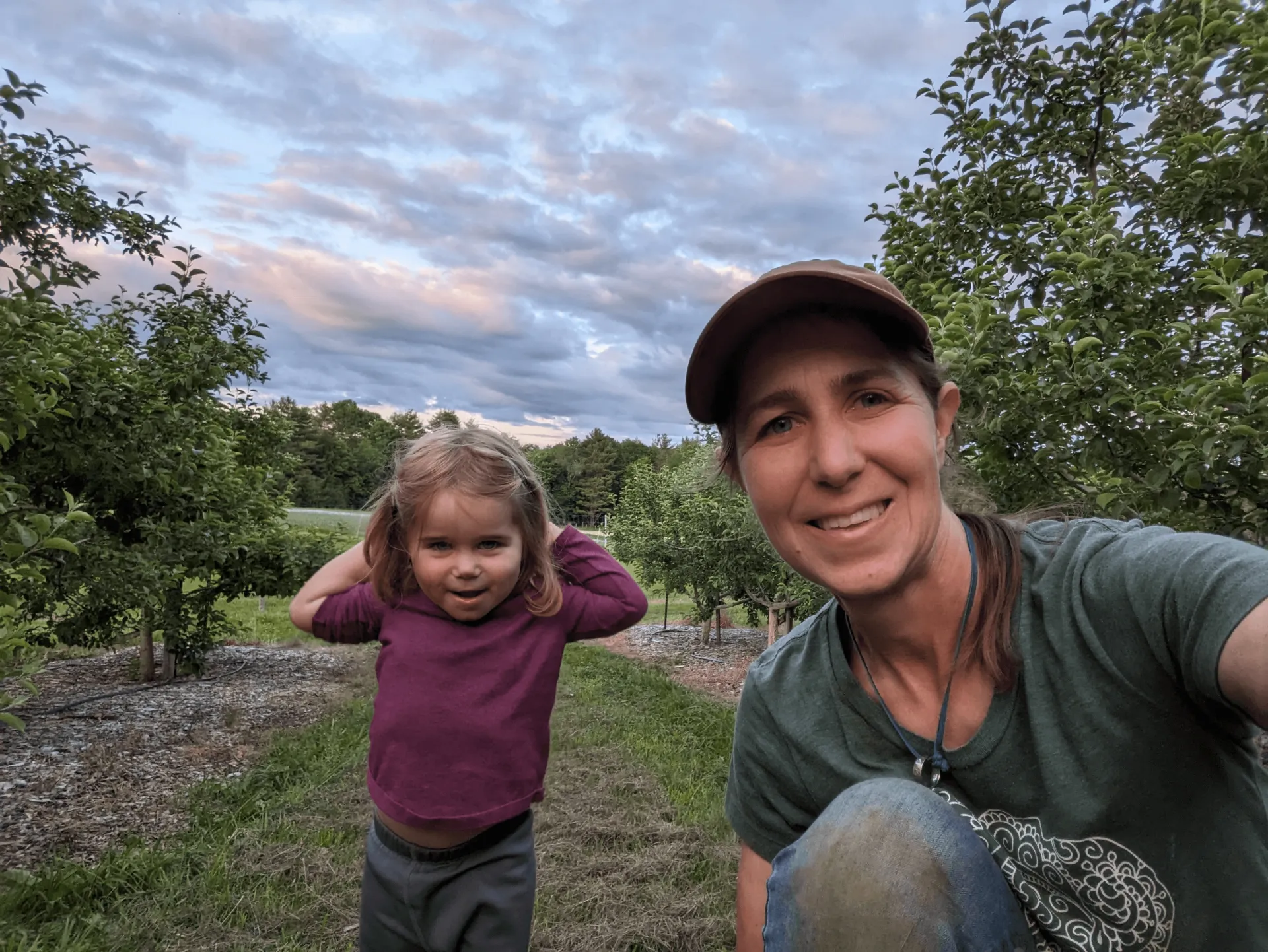“I spent a year while I was in college working at Sunrise Farm and really fell in love with it. I ended up taking a full-time job co-managing that farm for five years, and that was when I realized that this was where I was headed as a career," recounts Lake.
In 2012, Lake established her own Sweetland Farm on 87 acres in Norwich, VT, purchasing that newly conserved parcel of land from the Vermont Land Trust. Of the now conserved 200 acres that comprise her current farm, half is managed forest and half is open land with fifteen acres of vegetables, a three-acre fruit tree orchard, and the rest in rotational pasture or hay field.
After more than a decade of hard work after founding her farm, Norah Lake and Sweetland Farm are being recognized by the Sand County Foundation with the Leopold Conservation Award. Leopold Conservation Awards honor farmers, ranchers, and forestland owners who go above and beyond in their management of soil health, water resources, and wildlife habitat on working land. Given in honor of renowned conservationist Aldo Leopold, the award recognizes landowners who inspire others with their dedication to environmental improvement. In his influential 1949 book, A Sand County Almanac, Leopold advocated for "a land ethic," an ethical relationship between people and the land they manage. The Sand County Foundation and its national sponsor, American Farmland Trust, present Leopold Conservation Awards in 28 states. An independent panel of agriculture and conservation leaders evaluates applications for the award, which comes with $10,000 prize.
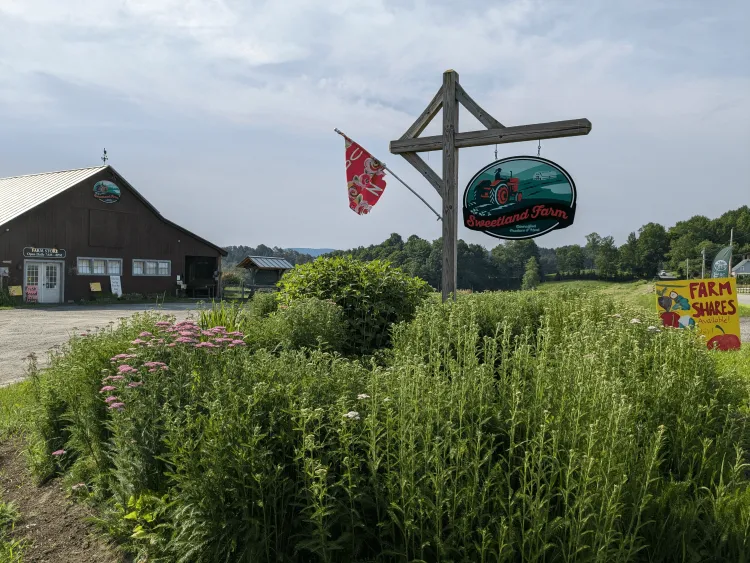
This prestigious honor not only recognizes the success that Lake has achieved in conservation, but also acknowledges that her diverse farm operation is both productive and well-managed. When she speaks of the meaning of this award, Lake is quick to point out that it takes a community of partners to be a successful small farm. “Within this community of conservationists, it is kind of a small world, and this award is such a perfect example of how we're all working together, and networking, and around our shared sustainability goals.”
Partnering with UVM Extension
They say it takes a village to raise a child, and a brigade of experienced Extension agents to raise a farmer – maybe they don’t say that last part, but they should.
“I really feel like 'support' is the theme of how I've interacted with UVM Extension,” Lake offers. She gives a lot of credit to UVM Extension’s Farm Viability Project, a two-year program that she participated in as a new farmer, and to Sam Smith, a UVM alum, who ran the Farm Viability Program when she was enrolled. “Sam was very helpful in assisting me in developing my business plan and zooming out on the basic question, ‘What do you want this business to look like?’ He helped me set my personal goals, business goals, and then helped me think about how I could get there with the smaller day-to-day or season-to-season planning.”
Her collaboration with Extension expertise continued after the start-up phase, “Vern Grubinger (Extension Vegetable and Berry Specialist) has always been a sounding board for technical questions, from ‘What cover crop should we be seeding and at what rate?’ …to ‘We have this unknown pest, can you help me identify it?’... to simply… ‘Is this business heading in the right direction?’ He has been willing to be a sounding board during different phases of the farm's growth, and he has given me lots of ‘you're doing a great job as the next-generation-of-farmer’ encouragement. I’ve gotten this from other Extension agents, too. They are really wonderfully multifaceted in the help that they are able and willing to provide.”
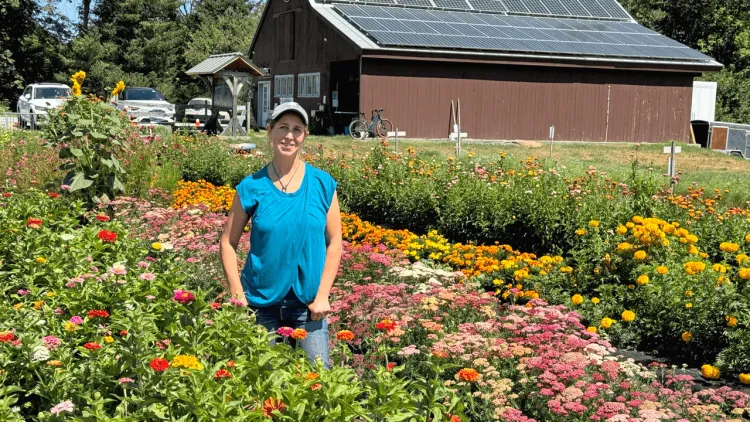
The long list of Extension agents who have worked with Lake all admire her, and concur that she is an exceptionally dedicated and inspiring farmer. Vern Grubinger describes her enterprise this way: “Sweetland Farm exemplifies how a robust network of partnerships can support stewardship of the land, sustainable agricultural production, and community-supported markets. These partnerships helped conserve the farm, expand infrastructure, provide technical assistance, and nurture a loyal customer base. Non-profits, state agencies, Extension, and like-minded businesses offered funding, know-how, products, and services needed to build a for-profit farm that honors ecological and social values. It takes a special set of skills to weave this complex network together and navigate challenges such as labor, weather, regulations, and a pandemic, all while raising a family and starting a farm pretty much from scratch. Norah Lake is the individual at the core of this success, and she is highly deserving of the Leopold Conservation Award.”
Rebecca “Becky” Maden (Extension Vegetable Nutrient Management Specialist) highlights the significance of the Leopold Conservation Award going to a small Vermont farm, “Annual crops are often not considered great for the environment. There are lots of ways people can mess it up. We have some farmers like Norah, who are doing such amazing things, and just out of their own ingenuity and thoughtfulness, and awareness of the environment, are creating systems that are incredible. So, I'm really thrilled that she's getting that spotlight on her. Her farm is a really unique example of somebody who's started out very diversified and has stayed diversified and is really leaning into that in a way that I don't see a lot. Only about 20% of the people I work with are women-operated farms, where a woman is the sole owner. And Norah has kids. That's not an easy lift. I think she's just a really impressive farmer. One of the things that sets her apart is her ability to keep her ‘Big Picture’ in mind, despite small setbacks or challenges, and to reach out for support when she needs it.”
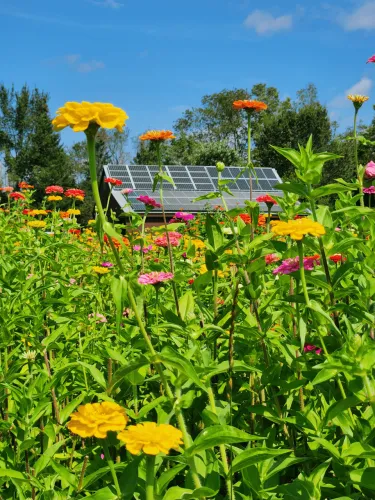
Lake is grateful for all that Maden has helped her with, “I've worked closely with Becky on my soils. We participated in one of her tomato high tunnel studies. I've attended some of the events she has coordinated, such as one on beneficial insect habitat planting, which I recently attended. Some of Becky’s winter growers’ workshops have been really great continuing education for me in the downtime of January.
“I've also worked fairly closely with Terry Bradshaw. We have about a three-acre fruit tree orchard with over fifty varieties of apples, pears, plums, and peaches. I was very new to growing perennials and to growing fruit when I started, and so being able to work with him and learn not only the nuts and bolts but also the more nuanced aspects of an ecologically grown orchard has been really great.”
Terence “Terry” Bradshaw is Chair of UVM’s Department of Agriculture, Landscape, and Environment, and Director of UVM’s Horticulture Research and Education Center. However, he is generally known in Vermont agricultural circles as the “Apple Guy.” This is how he describes his work with Lake. “I first met Norah after she established an orchard on a gently sloping hillside that overlooks the vegetable fields and pastures of her highly diversified farm. By including tree fruit in her product mix, Nora has extended her season and markets while helping to provide a more complete farm share to her loyal customers. In the field, Nora and her team model the best practices pulling from organic, regenerative, and integrated pest management systems to grow food and community while improving the environment. Their commitment to conservation is further shown by their commitment to not only reducing greenhouse gas production, but to actually sequestering carbon through their farm and forestry practices, and the use of renewable energy at all points in their systems. Nora’s unwavering dedication to growing the best food in the best way for her community makes her an ideal recipient of the Leopold Conservation Award.”
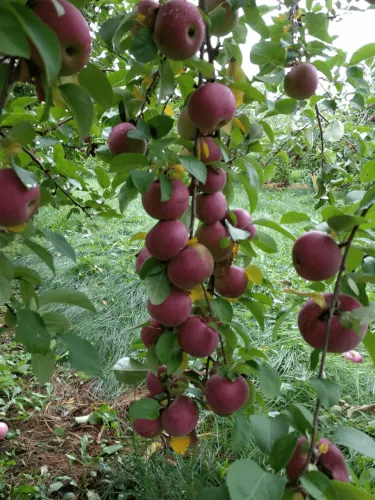
The list of Extension agents she has worked with continues as she mentions another invaluable collaborator, “I’ve worked with Hans Estrin for produce safety, and Hans is a great example of how Extension can help with the big picture as well as navigating the details. We built a new Wash & Pack, and Hans was able to help me think about the design and develop our whole produce safety plan. Then on the details side, when I wasn't sure what dose to use with my new wash-water sanitizer, I was able to just pick up the phone and call him. He had this wonderful, premade calculator tool that he showed me how to use.”
Hans Estrin, (Produce Safety Specialist and CAPS Coordinator for Extension) describes his 15-year Extension partnership with Lake this way, “Sweetland is pioneering a new age of diversified conservation—of their soil, diversified production, local markets, community building. Norah is energetic, hardworking, inventive, and positive about the present potential within her community. In farm collabs, we meet farms where they are and then try our best to support them...and get out of the way. Ideally, the farms will take the lead. Norah and Sweetland are a model for this kind of collaborative bottom-up leadership...we help them hatch ideas, plans, and grant applications, and then they run with it. We take their "run-with-it" success and use it to help secure future funding for farms like theirs. It is positive feedback that plays on this energy exchange and collaborative innovation.”
Lake is enthusiastic when describing how much she has leaned into the expertise of the battalion of Extensionists, “I would describe Extension as a collection of researchers who also have boots on the ground knowledge and understanding of production farming, who are available to advise, coach, and help solve problems with farmers. Having that multifaceted support from Extension helps me better address all of those different components of a sustainable farm. Each has their own specialty, and so getting to know the whole roster of people is really helpful. Knowing that you're going to reach out to Ann Hazelrigg when you have a pest question, you're going to reach out to Terry when you have an orchard question, and you're going to talk to Becky about soils. Each one has their area of expertise, and they are all collaborating, and that's also really helpful for us as farmers, because everything we do on the farm is interrelated.
“It is really easy to get bogged down in the weeds during the growing season, and not have time to do empirical studies on which management strategy is going to best deal with cabbage aphids, and so having Extension do those studies, and then disseminate the information, is incredibly valuable!"
"I think one of the wonderful things about Extension is that it changes with the times. They've been doing this for more than 100 years, but they haven't stagnated. They understand that times have changed, and they're really keeping up with the current needs and options, and really helping everyone push the envelope on growing practices.”
Making Conservation Central to the Sweetland Mission
Pushing the envelope is something Lake does regularly. Starting in 2018, she set her farm on a new ambitious trajectory: To cut 90% of her carbon emissions by 2028. Here’s how she introduced this goal to her customers and neighbors: “We’ve vaguely been working on this goal for years – you know, swapping to LED light bulbs, sealing air gaps, a few solar panels. But for the first 8 seasons, building the farm into a sustainable business – where sustainable had more of a financial meaning – occupied the front of our minds. This year, we got serious and made a real climate action plan, and along with it a pledge: We are pledging to reduce the farm’s fossil carbon emissions by 90% in 10 years. Yup. 90 in 10. Starting from a 2018 baseline, when we’d already done some cutting. It’s ambitious. Ludicrous even. More ambitious than any other goal we’ve heard any local company or municipality commit to. But plenty of people told us 8 years ago that starting a new farm was somewhere between ambitious and ludicrous too! And this rate of reduction is just what needs to be done. Factoring in our carbon-sensitive forest- and soil-management practices, the farm will be carbon-negative by 2022 and will sequester about 100 tons of carbon per year by 2028.”
Norah recognizes that her farm’s Climate Pledge, available with lots of details on the Sweetland Farm website, might provide a trail guide for other farms looking to take a similar journey and adopt a more carbon-neutral approach. What she wants to emphasize is -- though it was a push, it wasn’t impossible.
“I started by essentially solarizing the farm, putting panels on every single South-facing roof that we have, then electrifying as much of our equipment as possible, such as irrigation pumps, delivery vehicles, heat pumps, and eventually tractors when they become available. One of the really big, exciting projects that we have just brought online is a new wood-fired boiler that is going to heat our winter growing space. The woodchip-burning boiler will be able to use chips from our own forest to heat our greenhouses. We're now building a more winterized polycarbonate rigid-sided greenhouse to be our main winter growing facility, so I’m really excited to be able to extend and expand our season, but without the use of fossil fuels.”
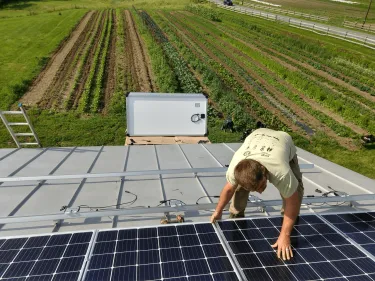
Bringing it full circle through education for other farmers
Her former teacher aspirations have also blossomed in an unexpected way, as Lake often hosts educational workshops for other farmers at Sweetland, “Bringing education to the farm is a nice way to scratch my teacher itch, while still making a living as a production farmer.”
Becky Maden has been grateful for Sweetland’s willingness to be a host farm as well as a model business. "Norah has hosted several workshops, and they've been really well received. She's a really great partner with Extension projects and programs. The farming community here in Vermont is very Interested in the specifics. So, when they see that Norah and Sweetland Farm have received this conservation award, they will want to know exactly what she is doing, and what tools she is using to do that, and what are the outcomes? Then Extension can provide the support to help farmers follow up and implement the ones they're interested in.”
Sounds like the perfect fertile cycle: Vermont farmers and UVM Extension collaborating to keep Vermont an agricultural leader.
Congratulations to Sweetland Farm and Norah Lake on this well-deserved honor and the farm’s success!
